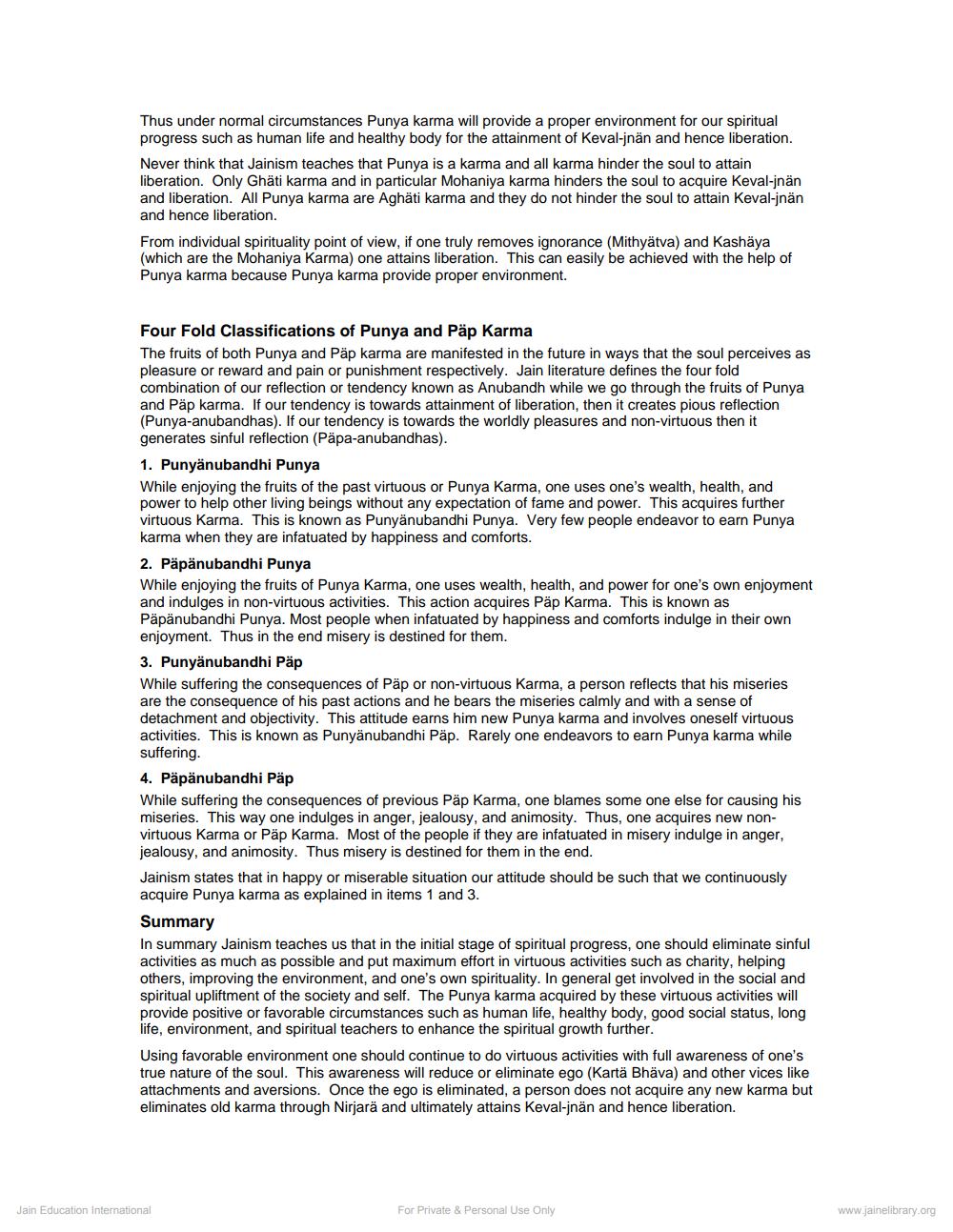Book Title: Punya and Pap Karma Author(s): Pravin K Shah Publisher: JAINA Education Committee View full book textPage 2
________________ Thus under normal circumstances Punya karma will provide a proper environment for our spiritual progress such as human life and healthy body for the attainment of Keval-jnän and hence liberation. Never think that Jainism teaches that Punya is a karma and all karma hinder the soul to attain liberation. Only Ghäti karma and in particular Mohaniya karma hinders the soul to acquire keval-jnän and liberation. All Punya karma are Aghäti karma and they do not hinder the soul to attain Keval-jnän and hence liberation. From individual spirituality point of view, if one truly removes ignorance (Mithyätva) and Kashaya (which are the Mohaniya Karma) one attains liberation. This can easily be achieved with the help of Punya karma because Punya karma provide proper environment. Four Fold Classifications of Punya and Pap Karma The fruits of both Punya and Päp karma are manifested in the future in ways that the soul perceives as pleasure or reward and pain or punishment respectively. Jain literature defines the four fold combination of our reflection or tendency known as Anubandh while we go through the fruits of Punya and Päp karma. If our tendency is towards attainment of liberation, then it creates pious reflection (Punya-anubandhas). If our tendency is towards the worldly pleasures and non-virtuous then it generates sinful reflection (Päpa-anubandhas). 1. Punyänubandhi Punya While enjoying the fruits of the past virtuous or Punya Karma, one uses one's wealth, health, and power to help other living beings without any expectation of fame and power. This acquires further virtuous Karma. This is known as Punyänubandhi Punya. Very few people endeavor to earn Punya karma when they are infatuated by happiness and comforts. 2. Päpänubandhi Punya While enjoying the fruits of Punya Karma, one uses wealth, health, and power for one's own enjoyment and indulges in non-virtuous activities. This action acquires Päp Karma. This is known as Päpänubandhi Punya. Most people when infatuated by happiness and comforts indulge in their own enjoyment. Thus in the end misery is destined for them. 3. Punyänubandhi Päp While suffering the consequences of Päp or non-virtuous Karma, a person reflects that his miseries are the consequence of his past actions and he bears the miseries calmly and with a sense of detachment and objectivity. This attitude earns him new Punya karma and involves oneself virtuous activities. This is known as Punyänubandhi Päp. Rarely one endeavors to earn Punya karma while suffering. 4. Päpänubandhi Päp While suffering the consequences of previous Pap Karma, one blames some one else for causing his miseries. This way one indulges in anger, jealousy, and animosity. Thus, one acquires new nonvirtuous Karma or Päp Karma. Most of the people if they are infatuated in misery indulge in anger, jealousy, and animosity. Thus misery is destined for them in the end. Jainism states that in happy or miserable situation our attitude should be such that we continuously acquire Punya karma as explained in items 1 and 3. Summary In summary Jainism teaches us that in the initial stage of spiritual progress, one should eliminate sinful activities as much as possible and put maximum effort in virtuous activities such as charity, helping others, improving the environment, and one's own spirituality. In general get involved in the social and spiritual upliftment of the society and self. The Punya karma acquired by these virtuous activities will provide positive or favorable circumstances such as human life, healthy body, good social status, long life, environment, and spiritual teachers to enhance the spiritual growth further. Using favorable environment one should continue to do virtuous activities with full awareness of one's true nature of the soul. This awareness will reduce or eliminate ego (Karta Bhäva) and other vices like attachments and aversions. Once the ego is eliminated, a person does not acquire any new karma but eliminates old karma through Nirjarä and ultimately attains Keval-jnän and hence liberation. Jain Education International For Private & Personal Use Only www.jainelibrary.orgPage Navigation
1 2 3
